|
In 1379 a Christian sermon was given for
the first time on the Kama banks: a monk Stephen, later called
Stephen of Perm the Great, preached to the Komi-Permyaks.
In 1455 the people of Cherdyn were baptized by Bishop Piterim.
Bishop Iona set churches in our land. There were some war
campaigns and spiritual missions so that in 1505 Perm the
Great joined the state of Moscow and its land became Russian.
Alongside with the first copper foundry temples were constructed:
in 1726 the Church of St. Peter and Paul was consecrated.
| |

|
|
Eugene A. Popov (1824 - 1888).
An archpriest, he studied theology, history and local
lore
|
When the province of Perm was established
by the Tsar, the Arms of the town had "a silver bear
upon a red field, and the Gospel set in golden framework upon
the bear, and a silver cross above the Gospel..." The
Emperor crown above the shield of the province's Arms meant
that the province of Perm was under the protection and power
of the Russian Tsar. The Gospel was a symbol of the Russian
Orthodox Church power. By the beginning of the nineteenth
century there were four churches in Perm.
John, the Father Superior in the Eparchy of Perm, cared about
opening a consistory and seminary. People famous in the land
attended the se minary: an archpriest E. A. Popov who became
the Eparchy's historian, A. S. Popov who invented the first
radio set receiving electric signals by air, a writer D. N.
Mamin-Sibiryak, a priest I. M. Pervushin who was elected a
Corresponding Me mber of the Academies in Saint-Petersburg,
Paris and Naples, Dr. P. N. Serebrennikov, a public figure,
and many others.
The Reverend Justin composed a Slavic grammar book for theological
colleges and schools and gave his library to the se minary.
Bishop Arkady was a zealous missionary. Archbishop Antony
helped to built the Dormition nunnery. Bishop Vladimir is
remembered because in his time the Eparchy got a school for
women and the number of church schools in the province increased
three times.
| |
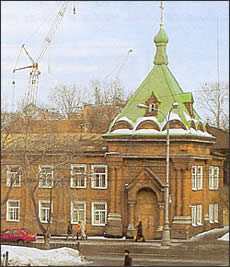
|
|
Chapel of Stephen of Perm the
Great
|
Churches, monasteries and cloisters in
the province were built by the care of the Eparchy senior
priests with the money raised by parishioners. Thus, Archbishop
S. A. Lukanin did a lot to open the monastery on the White
Mount and some churches in Perm, i.e. the church of St. Sophia
at the Eparchy's women school, the church of St. Nicolas and
Alexander at the Maryinsky classical school and the church
of St. Michael at the blind's school. The Cathedral, the church
of Sludka, the church of John the Gildmouth, the Resumption
church and others were open. By the beginning of the twentieth
century there were 20 Russian Orthodox churches and Cathedral
and 1 church of those schismatic who joined the Orthodox Church
in Perm.
People practising other religions had churches and temples
of their own. Thus, there were a Protestant church, a Catholic
church, a mosque, a synagogue.
In Russia for several generations the symbols of faithwere
substituted. Temples were destroyed or used for purposes distant
from God. In the province the high Christian idea endured
the persecutions and survived while priests serving it patiently
suffered and died under torture. Many of them are listed now
as the Holy Orthodox Church martyrs.
| |
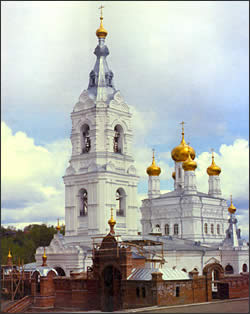
|
|
Holy Trinity Church in Motovilikha,
2001
|
Faith in the Communist future misled a
good many people from the way to God. Martyrs to their dogma,
they were far from being tolerant. But they built plants and
factories, houses and schools, developed science, went to
the front and died for their Motherland in the 1940s, strained
every nerve working at the home front, erected the Kamsky
Hydroelectric Station, flied in the space...
As our fellow-countryman, Michael Osorgin wrote, "both
those celebrating and those suffering from the celebration
were united by faith that all sufferings, privations ... were
just a terrible turning point between the past and future...
Looking ahead, they believed or wanted to believe that everything
would get all right... Perhaps, they were wrong but they thought
so. And as far as they were able to, each in his or her own
walk of life, they tried to adjust both personal and public
life upon the quite new basis..."
Life upon the quite new basis. This is far from easy - the
spiritual choice of the man is never easy. But on the Earth
only human beings have the spiritual vision, the soul, conscience,
mind in order to think over the past, understand the present,
choose the future.
| |
|
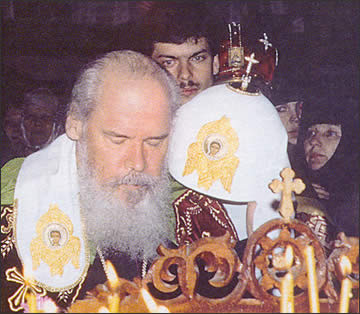
|
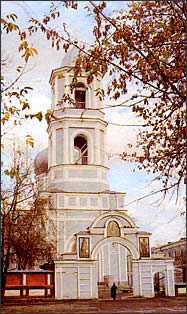
|
|
His Holiness Patriarch of Moscow
and all Russia Alexios II
|
Holy Trinity Church of Sludka
|
| |
|
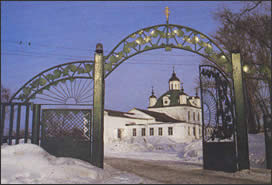
|
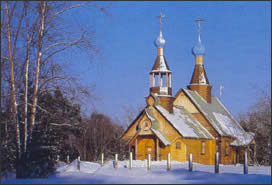
|
|
Church of St. Peter and Paul.
The first stone building in Perm
|
Church in Upper Kurya
|
| |
|
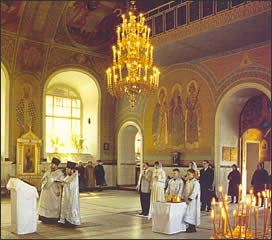
|
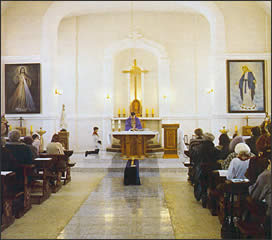
|
|
Russian Orthodox sermon
|
Catholic Church sermon
|
| |
|
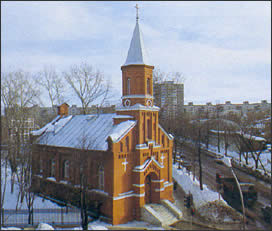
|
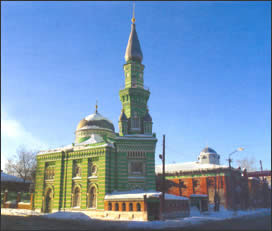
|
|
Lutheran Kirche
|
|
|



